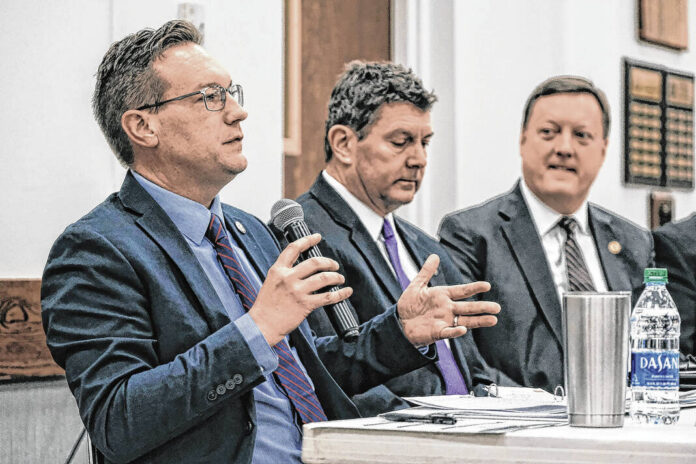
Mike Wolanin | The Republic Rep. Ryan Lauer, R-Columbus, answers a question about education initiatives during a Third House session at Donner Center in Columbus, Ind., Tuesday, January, 7, 2020. Lauer along with Rep. Jim Lucas, R- Seymour and Sen. Greg Walker, R-Columbus and Sen. Eric Koch, R-Bedford, answered questions from the public about their agendas for the upcoming legislative session.
Rep. Ryan Lauer, R-Columbus, has introduced a bill in the Indiana General Assembly that would prohibit medical professionals in Indiana from providing gender-affirming health care to transgender youth.
The bill, HB 1231, would bar health care professionals in Indiana from providing children younger than 18 with gender reassignment surgery, puberty blockers, hormone therapy, among other treatments that aim to help enable them to present as a gender different from the sex on their birth certificate, according to a copy of the bill.
The measure also would prohibit public funds from being used to reimburse or cover the procedures for minors, bar the distribution of public funds to organizations that provide gender-affirming procedures and punish medical providers who provide the treatments anyway by exposing them to civil liability.
Lauer, who described the treatments as “experimental procedures,” said he was “very concerned at the number of children” getting these procedures, which he said were “more prevalent than I could have imagined.”
When asked what the number was, Lauer said, “we’re getting more information as we move forward,” though he said that he has seen “numbers in the many hundreds” in Indiana.
“This is an issue that has concerned me, and, I’ll say, is one of the top issues constituents have reached out to me (about) over the past year,” Lauer told The Republic. “I think a lot of people are concerned with the very recent phenomenon of performing experimental surgeries on minors — on children.”
“I feel strongly enough that I think Indiana needs to put our foot down on experimenting on children,” Lauer added later in the interview.
A separate bill authored by Lauer, HB 1232, would prevent the Indiana Department of Child Services from classifying parents’ refusal to support their children’s gender identity or consent to gender-affirming health care as abuse. The measure also would prohibit courts from taking custody away from parents for the same reasons.
“If the parents aren’t supportive of (their children’s gender identity), that’s not abusing your children and is not a reason to remove children (from the home),” Lauer said. “…Not affirming the gender of your child is not abuse.”
With Lauer’s bills as well as similar bill filed by Rep. Michelle Davis, R-Whiteland, and another regarding gender pronouns used at schools filed by Rep. Jake Teshka, R-South Bend, Indiana joins at least a dozen states that are considering anti-transgender legislation this year, according to a tally by The Associated Press.
After a midterm election and record flow of anti-transgender legislation last year, Republican state lawmakers acros the country this year are zeroing in on questions of bodily autonomy with new proposals to limit gender-affirming health care and abortion access, according to wire reports.
As of Jan. 7, more than two dozen bills seeking to restrict transgender health care access have been introduced across 11 states — Kansas, Kentucky, Missouri, Montana, New Hampshire, Oklahoma, South Carolina, Tennessee, Texas, Utah and Virginia — for the legislative sessions beginning in early 2023, according to wire reports.
Last year, Arkansas and Alabama passed similar bans. But both were blocked by federal courts.
Bills targeting other facets of trans livelihood have been filed in many of the same states and are expected in several others with GOP majorities.
Gender-affirming health care providers and parents of trans youths are the primary targets of these bills, many of which seek to criminalize helping a trans child obtain what doctors and psychologists widely consider “medically necessary care.”
The World Professional Association for Transgender Health said last year that teens experiencing gender dysphoria can start taking hormones at age 14 and can have certain surgeries at ages 15 or 17. The group acknowledged potential risks but said it was unethical to withhold early treatments, which can improve psychological well-being and reduce suicide risk.
Cathy Renna, spokesperson for the National LGBTQ Task Force, told the AP that she views these bills as the product of “a permissible climate of hate,” driven by disinformation and fearmongering, that made anti-LGBTQ rhetoric more palatable in the years since former President Donald Trump’s election in 2016.
Last year, Indiana lawmakers passed a bill banning K-12 students who were born male but identify as female from participating in a sport or an athletic team that is designated for women or girls.
Republican Gov. Eric Holcomb vetoed the bill, but the General Assembly, including Lauer, voted to override the governor’s veto.
Lauer had vowed to vote to override the governor’s veto, touting the measure in a campaign mailer during the 2022 primary as an effort to “protect equal opportunity in girls’ sports” and telling voters that he “will proudly vote to overturn the veto.”
Last year, Lauer said he was happy to vote in favor of overriding the veto.
“I proudly voted in favor of that (overriding the veto) and for protecting girls sports,” Lauer said. “I want to make sure that we have fair competition in our schools and want to make sure that girls sports remains a class of sports and that we can just move forward.”
Currently, HB 1231 is pending before the Committee on Public Health, which is chaired by Rep. Brad Barrett, R-Richmond. HB 1232 is pending before the Committee on Family, Children and Human Affairs, which is chaired by Rep. Dale DeVon, R-Granger. Lauer is a member of the committee.
Rep. Ryan Lauer, R-Columbus, also has introducted other bills in the Indiana General Assembly, including:
HB 1092, which would appropriate just over $5 million per year for the next two years to the Columbus Learning Center to pay for its operating expenses and would extend its lease for another 10 years
HB 1314, which would establish a pediatric cancer research and treatment grant program administered by the Indiana Department of Health that prioritizes innovative research and treatments with potential for novel therapies for pediatric cancer. The grant program would initially be appropriated $2 million.
HB 1189, which would require the Indiana Department of Child Services to disclose to the public additional information about cases of child fatalities or near fatalities, including the summary of the circumstances surrounding the incident within a few days, a detailed summary of the incident within 90 days, the name of the perpetrator and the prepatrator’s past history of committing child abuse, among other information.
Other legislation filed by Lauer can be found here: iga.in.gov/legislative/2023/legislators/legislator_ryan_lauer_1/




